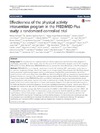Identificador persistente para citar o vincular este elemento:
https://accedacris.ulpgc.es/jspui/handle/10553/45926
| Título: | Effectiveness of the physical activity intervention program in the PREDIMED-Plus study: a randomized controlled trial | Autores/as: | Schröder, Helmut Cárdenas-Fuentes, Gabriela Martínez-González, Miguel Angel Corella, Dolores Vioque, Jesús Romaguera, Dora Alfredo Martínez, J. Tinahones, Francisco J. Miranda, José López Estruch, Ramon Bueno-Cavanillas, Aurora Arós, Fernando Marcos, Ascensión Tur, Josep A. Warnberg, Julia Serra-Majem, Lluis Martín, Vicente Vázquez, Clotilde Lapetra, José Pintó, Xavier Vidal, Josep Daimiel, Lidia Gaforio, José Juan Matía-Martín, Pilar Ros, Emilio Castañer, Olga Lassale, Camille Ruiz-Canela, Miguel Asensio, Eva M. Basora, Josep Torres-Collado, Laura Garcia-Rios, Antonio Abete, Itziar Toledo, Estefania Buil-Cosiales, Pilar Bullo, Mònica Goday, Albert Fitó, Montserrat Salas-Salvadó, Jordi |
Clasificación UNESCO: | 32 Ciencias médicas | Palabras clave: | Older-Adults Cardiovascular-Disease Prevention Behavior Randomized Control Trial, et al. |
Fecha de publicación: | 2018 | Publicación seriada: | International Journal of Behavioral Nutrition and Physical Activity | Resumen: | Background: The development and implementation of effective physical activity (PA) intervention programs is challenging, particularly in older adults. After the first year of the intervention program used in the ongoing PREvención con DIeta MEDiterránea (PREDIMED)-Plus trial, we assessed the initial effectiveness of the PA component. Methods: PREDIMED-Plus is an ongoing randomized clinical trial including 6874 participants randomized to an intensive weight-loss lifestyle intervention based on an energy-restricted Mediterranean diet (MedDiet), physical activity promotion and behavioral support and to a control group using MedDiet recommendations but without calorie restriction or PA advice. Body mass index (BMI) and waist circumference (WC) are measured by standard clinical protocols. Duration and intensity of PA is self-reported using the validated REGICOR Short Physical Activity Questionnaire. The primary endpoint of the PREDIMED-Plus trial is a combined cardiovascular outcome: myocardial infarction (acute coronary syndromes with positive troponin test), stroke, or cardiovascular mortality. The present study involved secondary analysis of PA data (n = 6059; mean age 65 ± 4.9 years) with one-year changes in total, light, and moderate-to-vigorous PA within and between intervention groups as the outcome. Generalized estimating equation models were fitted to evaluate time trends of PA, BMI, and WC within groups and differences between intervention and control groups Results: After 12 months, average daily MVPA increased by 27.2 (95%CI 5.7;48.7) METs-min/day and 123.1 (95%CI 109. 7–136.6) METs-min/day in the control and intervention groups, respectively. Total-PA, light-PA, and MVPA increased significantly (p < 0.01) in both groups. A significant (p < 0.001) time*intervention group interaction was found for Total-PA and MVPA, meaning the PA trajectory over time differed between the intervention and control groups. Age, sex, education level, and BMI did not moderate the effectiveness of the PA intervention. BMI and WC decreased significantly with increasing MVPA, compared with participants who reported no changes in MVPA. | URI: | https://accedacris.ulpgc.es/handle/10553/45926 | ISSN: | 1479-5868 | DOI: | 10.1186/s12966-018-0741-x | Fuente: | International Journal Of Behavioral Nutrition And Physical Activity [ISSN 1479-5868], v. 15, (Noviembre 2018) |
| Colección: | Artículos |
Citas SCOPUSTM
31
actualizado el 08-jun-2025
Citas de WEB OF SCIENCETM
Citations
36
actualizado el 22-feb-2026
Visitas
164
actualizado el 27-sep-2025
Descargas
170
actualizado el 27-sep-2025
Google ScholarTM
Verifica
Altmetric
Comparte
Exporta metadatos
Los elementos en ULPGC accedaCRIS están protegidos por derechos de autor con todos los derechos reservados, a menos que se indique lo contrario.
